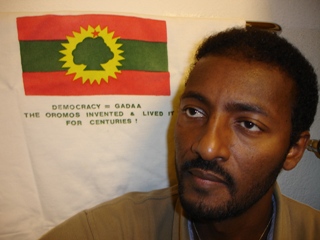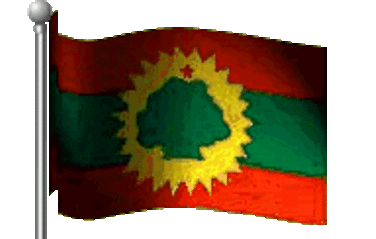By GRAHAM PEEBLES
March 1, 2013 (Counter Punch) — Land grab (and associated water appropriation), Oxfam states, occurs when “governments, banks or private investors buy up huge plots of land to make equally huge profits”. Since 2008 such speculation has vastly expanded; in 2009 alone the OI recorded that “foreign investors acquired 60 million ha of land [worldwide] – the size of France – through purchases or leases of land for commercial farming,” up from an annual average, pre-2008, of 4 million ha. Three quarters of all land deals take place in sub-Saharan Africa, in some of the most food-insecure, economically vulnerable, politically repressive countries in the world; precisely, some say, because of such advantageous commercial factors.
In Ethiopia, land sales are occurring in six key areas. Oromia and Gambella in the south, Amhara, Beneshangul, Gumuz, the Sidaama zone, or SNNP and the Lower Omo Valley – an area of outstanding natural beauty with acclaimed UNESCO World heritage status. The Ethiopian government’s conduct in Omo and Oromia, Genocide Watch (GW) considers “to have already reached stage 7 [of 8], genocidal massacres”. A statement that shocks us all, and casts shame upon the government and indeed slumbering donor nations, who act not, who speak not, but know well the cruel methods, which violate a plethora of human rights laws, employed by the Ethiopian People’s Revolutionary Democratic Front (EPRDF). A regime whose loyalties, it seems, rest firmly with investors, corporations, multi-nationals and the like, and who cares little for the people living upon the land, or indeed in the cities.
Forced from Home
Conditional within land lease agreements is the requirement that the government will clear the area of ‘encumbrances’, meaning indigenous people – families, children, pastoralists, cattle, wildlife, forests, anything in fact that will interfere with the leveling of the land, building of [foreign] workers’ accommodation, roads and the eventual sowing of crops.
The national three-year Villagisation program, initiated in 1985, aims to move 1.5 million people from their ancestral homes, over four states, into large settlements. The process is well under way, as these 2010 figures from Cultural Survival show, “by February 1987, 5.7 million people (15 percent of the rural population) had been moved into 11,000 new villages. By the end of this year, 10 million rural inhabitants (25 percent of the population) are expected to be villagized in 12 of Ethiopia’s 13 provinces.” Government propaganda justifying the policy states these new village centers will, “facilitate the provision of human social services by concentrating scattered homesteaders into central communities”, and facilitate ‘agrarian socialism’ – hence the leasing of mega chunks of land to multi-national corporations, without the participation of local people, whose land is being taken from them: a totalitarian version of socialism then.
Contrary to federal and international law, which requires the free, informed and prior consent of the people, this mass movement is being carried out without consultation or compensation, no matter the official claims to the contrary. Human Rights Watch (HRW) (28/08/12) reports how “Villagers who have been unwilling to move, or who refuse to mobilise others to do so, have been arrested and mistreated by the soldiers.” Once forcibly emptied, villages are destroyed and cattle killed or confiscated, the OI state, by government troops. Along with pastoralists, who number around 300,000 in Gambella alone, villagers are herded, sometimes literally, always metaphorically at the end of rifle, into Villagisation camps. And these, despite Government promises to, “provide basic resources and infrastructure, the new villages”, HRW found “have inadequate food, agricultural support, and health and education facilities”.
Resistance to moving is met with abuse and violence. HRW’s detailed report “Waiting for Death”, found that in Gambella, where the government plans to ‘relocate’ 225,000 people, “soldiers frequently beat or arrested individuals who questioned the motives of the program or refuse to move to the new villages [Villagisations]. Community leaders and young men are targeted [scores are arrested without due process]. There have also been credible allegations of rape and sexual assault by government soldiers. Fear and intimidation was widespread.” In a disturbing account of life within and without the Villagisation centers, the OI discovered, most disturbingly, that pastoralists (whose lifestyle and nature is to wander) if “encountered [by the military] outside of villages are told to relocate to the villages immediately”. Such restrictions conjure images of prison life rather than a peaceful, communal village, and contradict the government’s message of willing relocation, good community relations, participation and social harmony.
A Culture of Fear
Such abuse is not limited to Gambella – in the Lower Omo region, where huge, state-owned sugar plantations and the massive Gibe III Dam project are being developed, dissenting voices are, the OI report, subjected to “beatings, abuse and general intimidation”, in addition to extra-judicial prison sentencing.
“Fear and intimidation” is endemic, not just in areas associated with land sales, but throughout the country; suppression is common and freedom of expression greatly restricted. The media – TV, radio, press as well as print companies, are state-owned, so too the sole telecommunication company, restricting access to the internet, which is monitored. The judiciary is simply an extension of government, lacking credible independence, the political opposition marginalised and completely ineffective. International media are frowned upon and, in some areas (e.g. Ogaden) completely banned, such are the paranoid actions of the ruling EPRDF, which, it would seem, has much to hide.
Resentment and anger simmers amongst many displaced oppressed villagers. In April 2012 a group of men attacked the Saudi Star compound in Gambella and killed four employees. The men were quickly labeled ‘rebels’ and a military manhunt was instigated. The criminal act should be treated as such and the men brought to justice, however government forces have reacted with unwarranted unjustifiable violence and aggression to innocent civilians, as HRW (28/08/12) reported: “Ethiopian soldiers went house to house… arbitrarily arresting and beating young men and raping female relatives of suspects”. Any excuse, it seems, to unleash state violence, perpetrated by a regime that mistrusts even it’s own people. After the attack on Saudi Star, a company that has leased some 10,000 ha of prime Gambella land, the Ethiopian military accused four Anuak guards on duty at the time, of involvement in the attack and carried out extra- judicial killings (murder) on them all. Local villagers “alleged they were tortured”, and “women and girls raped either in their homes or in detention” (ibid). Illegal acts by the Ethiopian State that by any reasonable reading fits the definition of terrorism stated by the US military as, “the calculated use of unlawful violence or threat of unlawful violence to inculcate fear; intended to coerce or to intimidate governments or societies in the pursuit of goals that are generally political, religious, or ideological.” Terrifying tactics employed by the military in the search for information about ‘the rebels’ – a meaningless term evoking negative stereotypes, used alongside the ‘T’ word (terrorist) to demonise anyone who disagrees with disagreeable government policies and justify all violent measures by the benevolent regime – such is the perverse and dangerous use of language, facilitated by the international mainstream media that has infiltrated our imaginations.
The Myth of Development
The government proclaims land sales are part of a strategic, long-term approach to agriculture reforms and economic development, that foreign investment will fund infrastructure projects, create employment opportunities, help to eradicate hunger and poverty and benefit the community, local and national. The term development is itself an interesting one; distorted, linked and commonly limited almost exclusively to economic targets, meaning growth of GDP, established principally by the World Bank, whose policies and practices in relation to land sales, the OI discovered, “have glossed over critical issues such as human rights, food security and human dignity for local populations”, and its philanthropic sister, the International Monetary Fund; market fundamentalism driving the exported (one size fits all) policies, of both ideologically entrenched organisations, that promote models of development that seek to fulfill corporate interests first middle and last.
Defined in such limited ways, Ethiopia, having somehow achieved impressive GDP growth figures since 2004, (with a dizzy 9.8%, average, similar to that of India) would seem to be in the premiership of development. Inflation, though, sits at 30% and, whilst unemployment in urban areas has dropped to around 20%, over a quarter of young people aged 18-24 remain out of work; high unemployment in urban areas means young women are often forced into commercial sex work or domestic servitude.
Statistics compiled by The United Nations Development Programme (UNDP), provide a broader, less GDP-rosy picture of the country. They place Ethiopia 174th (from 187 nations) on the Human development index (HDI), with average life expectancy of 59 years and 40% of people living in poverty (on less than $1.25 a day). The 2012 Global Hunger Index makes Ethiopia the 5th hungriest country in the world (IFPRI), with between 12 and 15 million people a year relying on food aid to keep them alive. What growth there is benefits the rich, privileged minority. There is a growing divide between the 99.9% and the small number of wealthy Ethiopians – who, coincidentally, are mainly members of the ruling party trickle down, gushing up’, concentrating wealth with the wealthy; as the Inter Press Service (IPS) 22/08/12 reports, “development has yet to reach the vast majority of the country’s population. Instead, much of this wealth – and political power – has been retained by the ruling party and, particularly, by the tiny Tigrayan minority community to which [former Prime Minister] Meles belonged.”
“Protect, Respect and Remedy”
Protagonists laying claim to the all-inclusive healing powers of agriculture and agro-industrial projects, contradict, the OI states, “the basic facts and evidence showing growing impoverishment experienced on the ground”. What about the bumper benefits promised, particularly the numerous employment opportunities? It turns out industrialised farming is highly mechanised and offers few jobs; overseas companies are not concerned with providing employment for local people and care little for their well-being, making good bedmates for the ruling party. They bring the workers they need, and are allowed to do so by the Ethiopian government, which places no constraints on their operations.
Such shameful indifference contravenes the letter and spirit of the United Nations (UN) “Protect, Respect and Remedy” Framework. Endorsed by the UN Human Rights Council on 16th June 2011, the guiding principles outlined, “provide an authoritative global standard for preventing and addressing the risk of adverse impacts on human rights linked to business activity.” Corporations have a duty under the framework to “prevent or mitigate adverse human rights impacts that are directly linked to their operations… even if they have not contributed to their impacts”i Although not legally enforceable, these principles of decency offer recourse to human rights organisations and community groups, and should be morally binding for multinationals, whose profit-driven activities in Ethiopia, facilitated by a brutal regime that ignores fundamental human rights, are causing intense suffering to hundreds of thousands of indigenous people.
Graham Peebles is director of the Create Trust. He can be reached at:
graham@thecreatetrust.org


